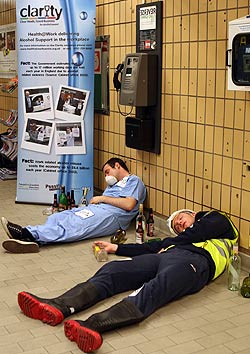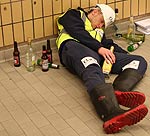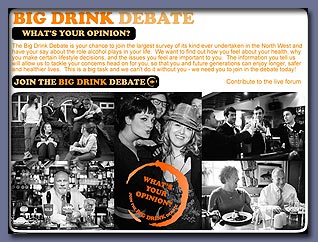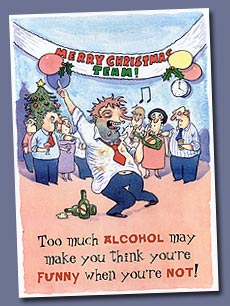Drunken Workers Surprise Liverpool Commuters
 Health@Work (H@W) gave commuters a surprise at Moorfield’s station yesterday with the re-launch of their workplace alcohol campaign.
Health@Work (H@W) gave commuters a surprise at Moorfield’s station yesterday with the re-launch of their workplace alcohol campaign.
The charity employed two actors to pose as drunken workers at the station, to promote the Clarity campaign.
Clarity aims to encourage sensible alcohol consumption amongst city workers and support employers to positively deal with workplace alcohol problems.
Keith Gorman from Health@Work said: “Early morning workers were certainly amused and startled by the PR stunt, but while it was all in good fun, we want to bring attention to a serious issue - alcohol misuse in the workplace. This is a major problem in England, costing our economy up to £6.4 billion a year, with 17 million working days lost annually due to alcohol related sickness.”
 He added: “In Liverpool we want to tackle this problem and communicate how damaging alcohol misuse is both to the well being of staff and the performance of the business.
He added: “In Liverpool we want to tackle this problem and communicate how damaging alcohol misuse is both to the well being of staff and the performance of the business.
Working in partnership with the Liverpool PCT, we are offering advice to employers to help combat alcohol problems in work and develop workplace alcohol policies for their staff.”
Whilst many will feel that such a message is part of the 'nanny state' agenda and a sign of the 'bah humbug' brigade trying to ban Christmas festivities, the reality of alcohol abuse and the cost to society in terms of ill health, early deaths and a burden on the NHS; has been highlighted this week in the publication of a new report by the North West Public Health Observatory at the Centre for Public Health. The new analysis by Liverpool John Moores University continues to show the rising toll alcohol abuse is having on health.
The Local Alcohol Profiles for England record a 9% rise in hospital admissions for alcohol-related harm (an additional 174 admissions a day). Deaths from chronic liver disease are up by 7% and 5% in women and men, respectively.
The only encouraging news was a reduction of 10% in road accident deaths attributable to alcohol since 2003 to 2,900.
Liverpool, Halton and Wirral continue to feature in areas highlighted as worst affected by alcohol harm.
Prof Mark Bellis, Director of the North West Public Health Observatory, said: “Rises in alcohol related health problems reflect not only weekend binge drinking but also how use of alcohol on a nightly basis continues to erode our health. Further increases in alcohol problems are in store if we continue to focus on the symptoms of alcohol misuse, like night life violence and ill health, but ignore the causes such as cheap alcohol and a lack of recognition that alcohol is a dangerous drug.”
Read a summary of the report here
 The TUC has been calling for the development of workplace alcohol policies as far back as 2003.
The TUC has been calling for the development of workplace alcohol policies as far back as 2003.
The TUC's
2003 report, "Drink and work - a potent cocktail", states that people are drinking more now than
ever before, but few employers have alcohol policies in place to tackle any problems.
According to the TUC report, alcohol is a major factor behind absences from work with up to
14.8 million working days lost as a result of drinking every year. It is also estimated that longterm
sickness, unemployment and premature death due to alcohol abuse costs the UK
economy some £2.3 billion a year.
The TUC believes that not enough is understood about the effects of drink on the workplace,
and it is calling on the government to fund more research into the growing problem. It also
points to such workplace factors as stress, bullying and long hours, working away from home
and the office culture which can all lead to individual workers consuming more alcohol than is
good for them.
Unions are concerned that many employers are turning to companies which offer screening
and random testing as a means of dealing with alcohol and the workplace. The TUC believes
that these are never effective at keeping drink away from work, and they raise a number of
privacy and human rights concerns.
TUC General Secretary Brendan Barber said:
"Drink is definitely a workplace issue. People who like the odd drink or two may think their
drinking is under control, but their colleagues who have to cover for their 'duvet days' and long
lunches might think otherwise. Drinkers are also risking serious damage to their health. It’s in everyone’s interest that we tackle the UK’s growing drink problem."
TUC's Drugs and Alcohol pages from their Hazards At Work web pages can be accessed here
 Last month saw the release of the findings of the Big Drink Debate which looked at the nations drinking habits and involved over 30,000 people filling in both on-line and posted questionaires around alcohol use.
Last month saw the release of the findings of the Big Drink Debate which looked at the nations drinking habits and involved over 30,000 people filling in both on-line and posted questionaires around alcohol use.
The biggest ever survey on alcohol in the North West revealed that low price and
discounts are fuelling our unhealthy drinking culture.
Of the 30,000 respondents, 80% said that they thought low price and discounts increased
people’s drinking.
This revealing statistic is taken from The Big Drink Debate carried out earlier in the year in
a bid to understand why the region has one of the biggest alcohol problems in the country.
The results also revealed that 75% of respondents believe that large
measures are key to increased drinking; that 68% of respondents say allowing street
drinking increases alcohol use and over half of respondents believe advertising (56%) and
extended drinking hours (54%) are factors that increase drinking.
More than a quarter of respondents drink at harmful and hazardous levels, which suggests
that more than a million people drink at this level across the North West, and that nearly
half the respondents avoid town centres because of the drunken behaviour of others.
 Launched by Our Life in partnership with Government Office North West and The
Department of Health, the aim of The Big Drink Debate was to find out what people’s
views are on drinking and how it affects their health, safety and well being.
Launched by Our Life in partnership with Government Office North West and The
Department of Health, the aim of The Big Drink Debate was to find out what people’s
views are on drinking and how it affects their health, safety and well being.
The Big Drink Debate questionnaire was planned as a first response to the significant
harm caused by the way we use alcohol in the North West. This is highlighted by the
73,000 crimes a year in the region (50,000 of them violent) which are linked to alcohol and
one person being admitted to a North West hospital every seven minutes with an alcohol
related condition.
Professor Bellis, Director of the North West Public Health Observatory, which analysed the
results, said: "There is no such thing as a free drink. The real price the North West is
paying for ’buy two get one free‘ and other cheap booze promotions is poorer health, more
violence and, town and city centres seen by many as no-go areas at night.
“In the Big Drink Debate, four out of five people identified cheap alcohol and discounts as
driving increasing alcohol consumption. Many people already understand the dangers that
such increased drinking represents. The challenge now is convincing drinkers that
consuming less and paying more is likely to improve their health and the prospects of the
North West as a whole."
Sources: Health@Work / TUC / Our Life



 He added: “In Liverpool we want to tackle this problem and communicate how damaging alcohol misuse is both to the well being of staff and the performance of the business.
He added: “In Liverpool we want to tackle this problem and communicate how damaging alcohol misuse is both to the well being of staff and the performance of the business.  The TUC has been calling for the development of workplace alcohol policies as far back as 2003.
The TUC has been calling for the development of workplace alcohol policies as far back as 2003.  Last month saw the release of the findings of the Big Drink Debate which looked at the nations drinking habits and involved over 30,000 people filling in both on-line and posted questionaires around alcohol use.
Last month saw the release of the findings of the Big Drink Debate which looked at the nations drinking habits and involved over 30,000 people filling in both on-line and posted questionaires around alcohol use. Launched by Our Life in partnership with Government Office North West and The
Department of Health, the aim of The Big Drink Debate was to find out what people’s
views are on drinking and how it affects their health, safety and well being.
Launched by Our Life in partnership with Government Office North West and The
Department of Health, the aim of The Big Drink Debate was to find out what people’s
views are on drinking and how it affects their health, safety and well being.